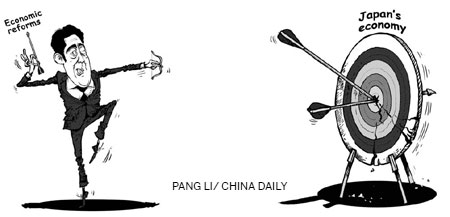The gamble that is Abenomics

Japanese Prime Minister Shinzo Abe on Wednesday fired the third arrow of "Abenomics" by promising to relax rules governing the sales of non-prescription drugs and allow selected cities to experiment with lower taxes and deregulation.
After being sworn in as prime minister at the end of 2012, Abe introduced "Abenomics" in an attempt to tide over the country's economic troubles. Abenomics includes "three arrows": quantitative easing, positive fiscal policies to stimulate demand and creation of sustainable growth.
The first two arrows, the depreciation of Japanese yen and a 2 percent rise in consumer prices index, have already been shot. The exchange ratio of the US dollar against yen increased from 1:80 to 1:101.52 on May 24, and then fell to 1:99.95 on June 5. Last year, the International Monetary Fund set the ratio at 1:100.47, while the Organization for Economic Cooperation and Development insisted that 1:103.9 was a more realistic ratio. So the ratio is close to Western economists' estimate.















